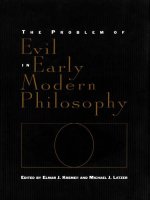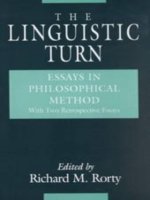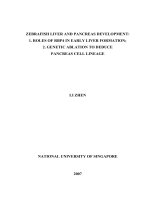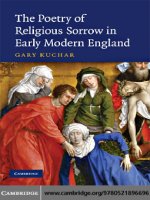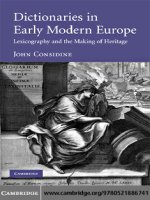university of toronto press the problem of evil in early modern philosophy dec 2001
Bạn đang xem bản rút gọn của tài liệu. Xem và tải ngay bản đầy đủ của tài liệu tại đây (10.01 MB, 188 trang )
The
Problem
of
Evil
in
Early Modern Philosophy
This page intentionally left blank
The
Problem
of
Evil
in
Early
Modern Philosophy
Edited
by
ELMAR
J.
KREMER
AND
MICHAEL
J.
LATZER
UNIVERSITY
OF
TORONTO PRESS
Toronto
Buffalo
London
©
University
of
Toronto Press Incorporated 2001
Toronto
Buffalo
London
Printed
in
Canada
ISBN
0-8020-3552-3
Printed
on
acid-free paper
Toronto Studies
in
Philosophy
Editors: James
R.
Brown
and Amy
Mullin
National Library
of
Canada Cataloguing
in
Publication Data
Main
entry under title:
The
problem
of
evil
in
early modern philosophy
(Toronto studies
in
philosophy)
Papers presented
at a
conference held
at the
University
of
Toronto,
Sept.
3-5,1999
ISBN
0-8020-3552-3
1.
Good
and
evil
-
Congresses.
2.
Theodicy
-
History
of
doctrines
-
17th
century-Congresses.
I.
Kremer,
Elmar
J. II.
Latzer, Michael John,
1961- III. Series.
BJ1401.P762001
111'.84
C2001-930698-9
University
of
Toronto Press acknowledges
the
financial
assistance
to its
publishing
program
of the
Canada Council
for the
Arts
and the
Ontario Arts Council.
University
of
Toronto Press acknowledges
the
financial support
for its
publishing
activities
of the
Government
of
Canada through
the
Book Publishing Industry
Development Program
(BPIDP).
www.utppublishing.com
Contents
Contributors
vii
1
Introduction
3
Elmar
J.
Kremer
and
Michael
J.
Latzer
2
Suarez
on
God's Causal Involvement
in
Sinful
Acts
10
Alfred
J.
Freddoso
3
Descartes's
Theodicy
of
Error
35
Michael
J.
Latzer
4
Spinoza:
A
Radical Protestant?
49
Graeme Hunter
5
Spinoza
in the
Garden
of
Good
and
Evil
66
Steven
M.
Nadler
6
Malebranche
on
Disorder
and
Physical Evil: Manichaeism
or
Philosophical
Courage?
81
Denis
Moreau
1
Bayle
on the
Moral Problem
of
Evil
101
D.
Anthony
Lariviere
and
Thomas
M.
Lennon
8
Leibniz
and the
'Disciples
of
Saint
Augustine'
on the
Fate
of
Infants
Who Die
Unbaptized
119
Elmar
J.
Kremer
vi
Contents
9
Leibniz
and the
Stoics:
The
Consolations
of
Theodicy
138
Donald
Rutherford
10
Remarks
on
Leibniz's Treatment
of the
Problem
of
Evil
165
Robert
C.
Sleigh,
Jr.
Contributors
Alfred
J.
Freddoso
Graeme Hunter
Elmar
J.
Kremer
D.
Anthony
Lariviere
Michael
J.
Latzer
Thomas
M.
Lennon
Denis Moreau
Steven
M.
Nadler
Donald Rutherford
Robert
C.
Sleigh,
Jr,
University
of
Notre Dame
University
of
Ottawa
University
of
Toronto
Lakehead University
Gannon
University
University
of
Western Ontario
Universite
de
Nantes
University
of
Wisconsin, Madison
University
of
California,
San
Diego
University
of
Massachusetts,
Amherst
This page intentionally left blank
The
Problem
of
Evil
in
Early Modern Philosophy
This page intentionally left blank
1
Introduction
ELMAR
J.
KREMER
AND
MICHAEL
J.
LATZER
The
essays
in
this volume
are
about
the
problem
of
evil
as it was
understood
and
wrestled
with
in the
seventeenth
and
early eighteenth centuries.
Or
perhaps
'problems'
of
evil would
be a
better designation, since many distinct issues
are
to
be
found
within
the
labyrinthine twists
and
turns
of
this momentous issue.
For the
philosophers
of the
period,
the
task
of
theodicy
was
both philosophical
and
theological. Philosophically, evil presented
a
challenge
to the
consistency
and
rationality
of the
world-picture disclosed
by the new way of
ideas.
But in
dealing
with
this
challenge, philosophers were also influenced
by the
theologi-
cal
debates
about original sin, free will,
and
justification that were
the
aftermath
of
the
Protestant Reformation,
and
that exercised
a
formative influence
on
Euro-
pean intellectual life right up to the publication of Leibniz's Theodicy in 1710.
I
Is
God
unable
to
prevent evil? Then
he is
impotent.
Is he
unwilling? Then
he is
malevolent.
Is he
both good
and
powerful? Whence, then,
is
evil?
The
problem,
in
this formulation,
is
that
the
theist seems
to be
committed
to an
inconsistent
triad:
God is
omnipotent;
God is
benevolent;
and yet
evil exists.
It
seems
that
any
two
parts
of the
triad taken together
are
inconsistent
with
the
third.
The
existence
of an
almighty
and
benevolent
God is
consistent
with
the
appearance
of
evil,
if
evil
is an
illusion. Similarly,
the
existence
of an
omnipotent
but
malev-
olent
God is
consistent
with
evil,
as is the
existence
of a God at
once benevolent
and
limited
in
power. And,
of
course,
if the
divine attributes
are
held
to be
beyond human comprehension entirely,
the
problem
of
evil
again
does
not
arise.
4
Elmar
J.
Kremer
and
Michael
J.
Latzer
God
would
in
such
a
case
be
said
to be
'good'
and
'powerful,'
but not in any
way
humans
can
understand; hence
the
alleged compatibility
of God and
evil
could
not be
established. Classical theism, however, disallows
the
abandonment
of
any
part
of the
triad,
and
insists that
we can
express
the
divine attributes
at
least analogically
in
human language. Thus
the
conditions
for a
genuine theod-
icy
are set out by
Leibniz,
the
philosopher
who
coined
the
word
'theodicy'
(from
the
Greek theos,
'God,'
and
dike,
'justice')
and for
whom
the
project
was
a
lifelong preoccupation:
A
genuine theodicy must consist
of a set of
proposi-
tions,
not
just hypothetical
but
actually true, capable
of
showing
the
ultimate
consistency
of the
existence
of God and
evil without sacrificing
the
attributes
of
God as
classically defined.
If
it is
possible
to
speak
of a
'consensus'
or
'mainstream'
approach
to
theod-
icy
in the
Christian West, such would
be the
theodicy
of
Saint Augustine,
to
whom Leibniz himself owed
a
great deal.
The
intellectual struggle with
the
problem
of
evil defines
the
philosophy
of
Augustine
to an
enormous degree.
As
he
records
in his
Confessions,
as a
young
man
Augustine
was
attracted
to the
sect
of the
Manichaeans
precisely
because
of
their
rational
solution
to the
prob-
lem of
evil: cosmic dualism. Rather than fruitlessly endeavouring
to
show
how
a
single all-good principle could account
for
evil,
the
solution
of the
Manichae-
ans
was to
posit
an
evil
god as the
source
of
evil, leaving
good
alone
as the
product
of the
good god.
In the
seventeenth century, Pierre
Bayle
will ironically
hail
the
'hypothesis
of the two
principles'
as
indeed
the
only truly reasonable
solution
to the
problem.
But
Augustine found
the
answer
to
Manichaeism
in his
discovery
of the
'nothingness'
of
evil. Because evil
is
literally no-thing,
but
simply
the
privation
or
absence
of a
good which ought
to be
present, there
is no
need
to
trace
its
presence
to any
evil god, still
less
to the
positive
will
of the one
good God.
God
merely
'permits'
the
privatio
boni which
his
power could easily
prevent,
but
which
his
goodness allows,
for his own
good reasons.
What
are
these reasons?
One of the
most famous
and
influential Augustinian
contributions, with roots
in
both pagan philosophy
and
biblical revelation,
is the
so-called
'aesthetic'
theme: that whole consisting
of
evil
and the
good made
possible
by and
drawn
out of
evil
is
better
than
a
condition simply
good
to
begin with, just
as
shadows
are
needed
in
paintings
and
dissonance
in
musical
compositions. Along
with
this theme, Augustine developed what
has
come
to
be
called
the
'free
will
defence.'
God is
able
to
draw
good
even
out of the
disordered (hence evil) choices
of
free
rational agents, angelic
and
human,
which
choices
are
themselves
the
causes
of a
vast amount
(if not
all)
of the
evil
around
us.
As
perennial
as the
themes
of
Augustine's theodicy
are the
challenges
to
them, challenges that
are
central
to the
theodicy debates
in the
early modern
Introduction
5
period.
If the
world containing
evil
is
ultimately
a
good
world
-
perhaps even
the
best
of all
possible worlds
-
does
this
not
amount
to a
denial
of the
reality
of
evil?
Is the
appearance
of
evil
not in the end a
function
of the
limitation
of
human
perception, such that,
to an
unclouded mind,
'whatever
is, is
right'?
And
if
God
incorporates human choices, good
and
bad,
in the
plan
for
creation con-
ceived from
all
eternity,
does
not the
inevitability
of
this plan imply that
no
creatures
are
really free?
So
acute
is
this problem,
and so
contentious
in the
history
of
Christian dogma, that Leibniz calls
it a
'labyrinth'
wherein human
reason
goes
inevitably astray.
In the two
centuries following
the
Protestant
Reformation,
the
problem
of
freedom
and
predestination
reached
an
unsur-
passed
degree
of
crisis, involving
not
just
a
plethora
of
excruciatingly
difficult
and
sophisticated attempts
at
solution,
but
social
and
cultural upheaval
as
well.
Thus
in the
seventeenth
and
eighteenth centuries,
the
theodicy problem
was no
mere idle puzzle
of
dogmatics,
but a
problem
of
immense social significance,
a
problem
which
cut to the
heart
of the
philosophical
and
theological projects
of
the
very best minds
of the
age.
II
The
problem
of
theodicy
is
urgent
within
the
philosophy
of the
early modern
period because
the
dream
of the new
scientists
was for a
complete explanation
of
reality without remainder,
a
physico-mathematical modelling
of the
world-
picture
without
any
irrational surd
to
spoil
the
picture.
It is
striking that Des-
cartes,
in the
Meditations
on
First Philosophy, tries
to
limit
his
dicusssion
of the
problem
of
evil
to the
problem
of
error,
or a
problem concerning
the
trust-
worthiness
of
clear
and
distinct ideas.
Of
course,
this restriction
of the
problem
cannot hold, since error
is
intimately connected with
sin or
moral evil,
and
Descartes
is
impelled
to
wrestle with evil like
any
traditional theodicist.
In the
Fourth
Meditation,
he
offers
a
version
of the
'free-will
defence,'
locating
the
origin
of
evil
in the
will
of the
erring creature. However,
as
Michael Latzer
argues,
Descartes's
free-will defence founders
on his
conception
of
God's
abso-
lute
and
inscrutable predestination
of all
events, including human
acts
of
thought
and
will.
Descartes
presents this conception
in his
correspondence
with
Princess Elizabeth
as
consoling
-
there
is a
Providence that
shapes
our
ends.
But
tracing evil
to its
source
in
utterly unfathomable divine
decrees,
and
placing
God
above
the
laws
of
mathematics
and
logic,
as
Descartes
does,
spells
the end
of
a
rational theodicy.
Descartes would have wanted
to
avoid such
an
outcome.
But
Spinoza,
by
contrast, makes
a
conscious
and
systematic
effort
to
undermine
the
traditional
preconditions
of
theodicy
in
favour
of
what
he
regards
as a
more truly
philo-
6
Elmar
J.
Kremer
and
Michael
J.
Latzer
sophical
(and more sublime) analysis
of
God, destiny,
and the
human condition.
Steven
Nadler points
out in his
'Spinoza
in the
Garden
of
Good
and
Evil'
that
Spinoza's denial that
God
acts
by
free
choice, that
God is
'good'
(as
defined
by
classical theism),
and
that
God
acts
for the
sake
of
ends, places
him
outside
the
domain
of
traditional theodicy.
But
Spinoza
is
also
interested
in the
project
of
consolation. Nadler locates Spinoza
in the
context
of
medieval Jewish theodi-
cies,
and
notes that although Spinoza rejects such elements
as
post-mortem rec-
ompense
for
good deeds done
and
injustice suffered,
he
sees
in
Gersonides hints
of
his own
prescription
for
happiness: freedom through scientia
intuitiva,
or
knowledge through
essences,
related
to
their
infinite
causes. Through
posses-
sion
of
adequate ideas,
and
indifference
to the
affective modes
of
good
and
evil,
the
reward
of
virtue
can be
found
in
this
world alone
and
authentic human good
realized.
However,
as
Graeme Hunter points
out in
'Spinoza:
A
Radical
Protestant?'
Spinoza
also
had
close ties
with
some
of the
radical Protestants
in the
Nether-
lands,
and in
some passages presents
his
work
as
part
of a new and
more radical
Protestant reformation. Hunter rejects
the
traditional reading
of the
Tractatus
Theologico-Politicus
through
the
lenses
of the
Ethics,
and
examines Spinoza's
dicta
in the
Tractatus concerning
the
spirit
of
Christ,
the
essentials
of
Christian
belief,
and the
principles
of
Christian reformation
on the
premise that they were
sincerely held
and
seriously intended. Hunter argues that against
the
crude
anthropomorphism
of
Cartesian divine voluntarism,
the
Spinoza
of the
Tracta-
tus
offers
an
orthodox understanding
of
divine providence, ruling
all
things
by
grace, mercy,
and
pity.
Leibniz
is
another
of the
moderns whose Christian orthodoxy seems
to sit
uneasily
with
his
philosophical principles.
The
tension
in
Leibniz's case
is
brought
out by
Donald Rutherford
in
'Leibniz
and the
Stoics:
The
Consolations
of
Theodicy.'
Like
the
Stoics, Leibniz teaches
a
doctrine
of
consolation based
on
the
pursuit
of
virtue grounded
in the
knowledge
of
divine justice. Leibniz
insists
that
his
conception
of the
Fatum
Christianum
offers
a
richer consolation
than
the
Fatum
Stoicum,
because
the
Fatum Christianum includes
an
affirma-
tion
of
God's
providential care
for
individual human beings.
In the
last analysis,
however,
Leibniz does
not
locate beatitude
in
resignation
to the
Redeemer
of
worldly
suffering,
or in the
timeless beatific vision,
but in the
'perpetual
progress'
of the
unending development
of
substances,
and the
independence
from
fortune which true virtue,
and
conformity
with
the
universal will, provide.
Recognition
of the
seriousness
of
Leibniz's consolatory
and
apologetic aims
in
theodicy
is a
welcome corrective
to
caricatures
of
Leibniz's
theodicy
as
shal-
low
and
merely popular. And,
in
fact,
as
Robert Sleigh notes
in his
essay, seri-
ous
scholarship concerning Leibniz's undertakings
in
theodicy
is in
relative
Introduction
7
infancy,
compared
to
other
aspects
of his
system.
Sleigh's
contribution
traces
some
of the
developments
in
Leibniz's thinking from
the
time
of the
early
Con-
fessio
Philosophi,
through
the
Discourse
on
Metaphysics,
and
finally
the
Theodicy,
particularly with regard
to
Leibniz's handling
of the
classical themes
of the
free-will
defence
and of
evil
as
privation.
As
always
in the
work
of the
great polymath, natural theology
is
never
far
removed
from
the
abstruse doc-
trines
of his
metaphysics, such
as his
theories
of
contingency
and of
individua-
tion.
His
genius
is in
bringing together
in
synthesis
his own
idiosyncratic
metaphysical
doctrines
and the
classical themes
of
Augustinan theodicy, includ-
ing
the
doctrine that
the
created universe
as a
whole reflects
God's
perfect wis-
dom and
power.
That there
is
nothing
to be
improved upon
in
God's
creation
is
common
to the
theodicies
of the
moderns.
But as
Denis Moreau argues
in
'Malebranche
on
Disorder
and
Physical Evil: Manichaeism
or
Philosophical
Courage?'
Male-
branche
is a
notable exception. For,
in a
striking way, Malebranche
is
willing
to
allow
that
God's
governance
of the
world through simple
'ways,'
while unim-
peachable
and
wholly
worthy
of the
Creator,
may
(and indeed
does)
involve
dysteleological
'surd'
evils, instances
of
suffering
of
which
we can
say, without
any
qualification, nuance,
or
excuse,
'It's
evil.'
Arnauld claimed that
in
this
respect Malebranche's theodicy
is
Manichaean.
It can
also
be
viewed
as a
pre-
cursor
of the
theodicies
of the age of the
Holocaust. Like
a
good Cartesian,
Malebranche
highlights
the
connection
of
error
and
moral evil. But,
unlike
Descartes,
he
shows
a
tolerance
for an
unredeemed remainder
of
physical evil.
In
abandoning
a
pristine world-picture, Malebranche thus credits
the
phenome-
nological
experience
of
suffering.
Ill
Another
reason
for the
seventeenth-century preoccupation with evil
and
theod-
icy,
equal
in
importance
to the
Rationalist dream
of a
perfect science, involves
the
labyrinthine problem
of
freedom
and
predestination, particularly
in the
cau-
sation
of
sin. Although
a
problem
with
a
biblical lineage,
the
contingencies
of
history brought
it, by the
early modern
period,
to a
near-crisis level
of
acute-
ness.
The
denial
of
human freedom
and the
determinism imposed
by
divine pre-
destination
which Martin Luther read
in
some
of the
Pauline epistles
was key to
the
Reformer's rejection
of the
efficacy
of
good works,
and of the
whole sacer-
dotal-sacramental
system
of the
Roman Church.
The
first
attempt
at a
reasoned
refutation
of
Luther
on
freedom, Erasmus's
On the
Freedom
of the
Will,
was
crushed
by the
more
powerful
reasoning
of
Luther's mighty Bondage
of the
Will.
Although
the
Church
devised
what
was
meant
to be a
definitive
answer
to
8
Elmar
J.
Kremer
and
Michael
J.
Latzer
Luther
at the
Council
of
Trent,
the
more than
a
century
of
rancorous struggle
over
grace
and
freedom which Catholics fought with Evangelical
and
Reformed
Churches spilled over into battles among Catholics.
The
most important debate
on
these topics within
the
Catholic Church
occurred
in the
meetings
of the
Congregationes
de
Auxiliis.
These
were
ad hoc
committees
of
cardinals called together
to
resolve
a
dispute that began
in
1588
with
the
publication
of the
Jesuit Luis
de
Molina's work
on the
agreement
of
free
will with grace,
and
related matters,
'according
to
Several Articles
in St.
Thomas,'
and its
repudiation
by
Domingo
Banez,
a
more traditional Thomist
and
the
leading Dominican theologian
of the
time.
The
meetings
lasted
from
2
January 1598 until
28
August 1607,
and
ended without
a
resolution
of the
issues. Dispute broke
out
again among Catholics
after
the
publication
of
Jan-
sen's
Augustinus
in
1640
and
continued into
the
eighteenth century. Alfred
Freddoso's
essay,
'Suarez
on
God's
Causal Involvement
in
Sinful
Acts,'
illus-
trates
the
degree
of
complexity that
the
problem
had
reached
in the
Jesuit camp
at
the
threshold
of the
seventeenth century. Suarez's
finely
tuned analysis
of the
concurrence
of God in the
sinful
acts
of
creatures
is an
attempt
to
walk
the
razor-thin line between ascribing
the
causation
of
evil acts
to God
(and
so
vio-
lating divine
goodness)
and
ascribing their causation
to
creatures (and
so
violat-
ing
omnipotence).
The
disputes between
the
various Christian denominations,
as
well
as
within
the
Catholic Church, provided much material
for
Pierre Bayle's Historical
and
Critical Dictionary.
Bayle's
massively erudite work intensified
the
theodicy
problem
on
many fronts, and, whatever
Bayle
may
have intended, provided
ammunition
for
atheology well into
the
late eighteenth century. (Its influence
is
felt,
for
example,
in
Hume's Dialogues Concerning Natural Religion.) Some
of
Bayle's
aporetic
challenges
on the
freedom-foreknowledge issue
are
discussed
by
D.
Anthony
Lariviere
and
Thomas Lennon
in
'Bayle
on the
Moral Problem
of
Evil.'
Typically cloaking
his
views
in
commentary
on the
views
of
others,
Bayle
voices
his
dislike
of
classical solutions
by
approving
the
Socinian denial
of
foreknowledge. This move
seemed
to
Bayle
at
least
more
reasonable
than
the
unfathomable affirmation
of
both divine foreknowledge
and
human liberty
of
indifference,
to be
found,
for
example,
in the
theodicy
of
William King. More
generally,
the
theodicy problem
is
given acute focus
by
Bayle through
his
insis-
tence
on two
theses: first, that
'good'
can be
applied
univocally
to God and
creatures,
so
that
we
cannot
get
away with claiming
God's
goodness
is
quite
unlike ours, subject
to
different
rules; and, second, that
God is
utterly
free
to
make
any
world, unfettered
by any
need
to
achieve plenitude
of
being,
or any
other quasi-aesthetic result. These theses generate
the
haunting
fear
that per-
haps
God is not
good
at
all.
Introduction
9
Leibniz's
Theodicy, written
in
response
to
Bayle,
was the
last
instalment
in
Leibniz's lifelong
effort
on
behalf
of the
reunification
of the
Christian churches.
Thus
in a
letter
of 2 May
1715, about eighteen months before
his
death,
he
expresses
his
pleasure
at the
favourable reception
of the
Theodicy
by
'excellent
theologians
of the
three
religions.'
Yet,
as we
have seen
in
connection with
Donald Rutherford's essay, Leibniz's
own
theological views were sometimes
sufficiently
unorthodox
to
threaten
his
project.
Elmar
Kremer,
in
'Leibniz
and
the
"Disciples
of
Saint Augustine"
on the
Fate
of
Infants
Who Die
Unbaptized,'
argues that Leibniz's repudiation
of the
Augustinian position
on
this particular
point
led him to a
markedly unorthodox position
on
original sin. Kremer also
argues that Leibniz's position
on the
fate
of
infants
who die
unbaptized reflects
an
important break with
the
Augustinian division
of the
problem
of
evil into
two
parts,
one
dealing with humans (and other intelligent
creatures)
and one
dealing
with
subhuman creatures.
Leibniz's discomfiture
is
archetypical
of the
early modern philosophers
in
their
dealings
with
the
problems
of
theodicy. Their philosophy tended
to put
them
at
odds
with
all of the
important Christian theological positions
on
sin,
grace,
and
justification.
Yet
they were forced,
for
practical
as
well
as
theoretical
reasons,
to
stay
in
touch with
the
ongoing
theological
discussion.
It is our
hope
that
the
studies
in
this volume will stimulate
further
research into
the
resulting
struggles
of the
early modern philosophers
to
resolve this most poignant
and
troubling
of
problems.
The
papers
in
this volume were delivered
at a
conference
on the
problem
of
evil
in
early modern philosophy held
at the
University
of
Toronto during
3-5
September 1999,
and
sponsored
by the
SSHRC,
by the
Department
of
Philosophy,
University
of
Toronto,
and by St.
Michael's College, University
of
Toronto.
We
would like
to
thank
Sebastien
Charles
and
Syliane Charles
of
the
University
of
Ottawa, Sarah Byers, Karen Detlefsen, Sarah Marquardt,
Jon
Miller, Tobin Woodruff,
and
Byron Williston
of the
University
of
Toronto,
and
Patricia Sheridan
of the
University
of
Western Ontario,
who
provided
commentaries
on the
papers,
as
well
as
those
who
attended
and
took part
in the
discussion
at the
conference.
Suarez
on
God's
Causal Involvement
in
Sinful Acts
ALFRED
J.
FREDDOSO
1.
Introduction:
Evil
and God
In
this paper
I
will
explore certain
key
features
of
Francisco
Suarez's
account
of
God's
action
in the
world, with
an eye
toward explaining
his
view
of the
precise
way
in
which
God
concurs
with
-
that
is,
makes
an
immediate
causal contribu-
tion
to -
free
action
in
general
and
sinful
action
in
particular. Suarez
agrees
with
his
mainly Thomistic opponents that
God is an
immediate cause
of
every
effect
produced
by
creatures
-
including every
free
act
and,
a
fortiori,
every
sinful
act
elicited
by
creatures
with
a
rational
or
'free'
nature.
But he
differs
markedly
from
them
in his
account
of how it can be
plausibly maintained that
God
permits
sin
without causing
sin or, to put it
somewhat differently,
how it can
be
plausibly maintained that
the
moral defectiveness
of a sin is not
traceable
to
God as a
source.
The
heart
of the
paper will
be
drawn
from
sections
2-4
of
Disputation
22 of
the
Disputationes
Metaphysicae
(DM),
but I
want
to
begin
by
defining
the
prob-
lematic
in
light
of
Suarez's general discussion
of the
metaphysics
of
evil
in
Dis-
putation
11.
Suarez
agrees
with traditional
writers
that what
is
'evil
in
itself
is
either
(a) the
privation
of
some good that ought
to
belong
to a
given subject
in
view
of its
nature
and
powers
or (b) the
subject itself insofar
as it
suffers
such
a
privation. Beyond this, however,
he
notes that
a
positive entity
can be
'evil
for
another'
in the
sense that
its
presence
in a
particular type
of
subject entails
the
absence
of
some good which that subject ought
to
have. Such
an
entity might
be
a
natural evil, that
is, a
positive
entity that
deprives
its
subject
of
some
natural
good
it
ought
to
have according
to the
standard
set by its own
nature.
For
2
Suarez
on
God's
Causal Involvement
in
Sinful
Acts
11
instance,
from
the
perspective
of
Aristotelian science heat
is a
positive entity
that
is
naturally
bad for
water, since water
is by its
nature cold; again,
a
sixth
finger
on one
hand
is a
positive entity that
is
naturally
bad for a
human being,
since
by
their nature human beings have
five
fingers on
each
hand; and, more
generally,
pain
is a
positive entity that
is
naturally
bad for
animals.
In
addition,
some positive entities that
are
'evil
for
another'
are
moral
evils,
that
is,
entities
that
are bad for a
free nature precisely insofar
as it is
free. Moral evil
is
divided
into
the
evil
of sin or
fault
(malum
culpae)
and the
evil
of
punishment
(malum
poenae),
a
distinction that Suarez characterizes
as
follows:
We
can say
succinctly
and
clearly that
the
evil
of sin
(malum culpae)
is a
disorder
in
a
free
action
or
omission
-
that
is, a
lack
of due
perfection
as
regards
a
free
action
-
whereas
the
evil
of
punishment (malum
poenae)
is any
other lack
of a due
good
that
is
contracted
or
inflicted because
of
sin.
(DM
11.2.5)
Thus,
a
sinful
act, while good
to the
extent that
it is a
real quality
of a
rational
will,
is
defective because
by its
nature
it
induces
a
privation
of the due
ordering
to
God
that
its
subject
- a
free
and
rational creature
-
ought
to
have.
An
evil
of
punishment,
on the
other hand,
can
itself
be
either
a sin
that
is
causally con-
nected
with
other sins
or
some other type
of
suffering
that
God
directly inflicts
or
at
least permits.
Although
Suarez
concedes
that
from
outside
the
Christian perspective
it
seems that human beings
suffer
natural evils that
are in no way
connected with
sin,
he
nonetheless notes that, according
to the
Faith,
all the
natural evils that
befall
us as
human beings
in
fact stem ultimately
from
sin and
especially from
original
sin, since
God's
antecedent intention
was
that
we
should
be
free from
sin
and
suffering
and
death:
Even though, leaving
aside
divine providence,
one
could
conceive
of
some
natural
evil
in a
rational creature which
was not
inflicted
because
of any
fault
and
which
would
thus
be
neither
a sin nor a
punishment, nonetheless,
we
believe that
in
con-
formity
with
divine providence
no
lack
of a due
perfection
can
exist
in a
rational
creature unless
it is a sin or
else
takes
its
origin from sin.
It is for
this reason that
Augustine,
In
Genesim
ad
litteram,
chap.
1,
says that every evil
is
either
a sin or a
punishment
for
sin.
In
fact,
it is not
only
the
evil that exists formally
in
human
beings,
but
also
that
which exists
in
irrational
and
inanimate things,
to the
extent
that
it
results
in
harm
for
human beings themselves, that pertains
to the
evil
of
punishment
- not
punishment with respect
to the
lower things
but
with respect
to
the
human
beings themselves, because
of
whose
sin it is
inflicted
or
permitted.
(DM
11.2.5)
12
Alfred
J.
Freddoso
(In
this connection, though,
it is
important
to
note
in
passing that punishment,
strictly
speaking,
is
contrary
to the
will
of the
sufferer.
So
within
the
Christian
dispensation
the
evil
of
punishment
loses
its
character
as
punishment when
it is
willingly
embraced
in
atonement
for sin out of
supernatural love
for God and
neighbour
and is in
this
way
joined
to the
redemptive
suffering
of
Christ.)
Having
laid
out
this taxonomy,
Suarez
turns
to the
causal origins
of
evil and,
more specifically,
to the
role
of the
First
Cause
in the
genesis
of
evil.
His
discus-
sion
is
subtle
and
complex,
and so I
will
limit myself
to
just
a few
relevant
points. Some natural evils
are the per
accidens
or
incidental by-products
of the
'perfect'
action
of
unimpeded
and
non-defective
created
(or
secondary) agents
on
non-defective patients,
and as
such they
are
traceable
to
God's
immediate
influence
in the
same
way
that they
are
traceable
to the
immediate
influence
of
their
proximate secondary causes.
By
contrast, other natural evils
find
their
direct source
in a
defect
of
power
in the
agents that cause them
or in
various
external impediments that keep their agents
from
'perfectly'
producing
the
effects
at
which they
are
aiming. Such evils
are not
causally traceable directly
to
God,
but
they
are
traceable
to him
indirectly
and in the
final
analysis, since
the
various defects
from
which they
originate
always have their ultimate
source
in
'perfect'
actions
of the
sort just described
(DM
11.3.23).
What's more, both nat-
ural
evils
and
evils
of
punishment
are
such that God,
as an
intelligent
and
prov-
ident agent,
can
directly intend them
for the
sake
of
some good, even
if he
cannot
be
a
per se and
immediate cause
of
them
(DM
11.3.21).
So on
Suarez's
view
there
is in
principle
no
metaphysical
or
moral problem
with
God's
being
a
causal source
in
some
way or
other
of
natural evils
and
evils
of
punishment.
Sinful
actions, however,
are a
different
story because they constitute
a
free
agent's
rejection
of
God's
unfailing love
and
impede
the
agent's
union with
God
and
with
other rational creatures.
As
such, they have
a
special repugnance
to
God's
goodness
and are
directly contrary
to
what
he
intends. Thus, even though
God
might
use our
sins
as
instruments
in
bringing
us to
true humility
and
repen-
tance,
he
cannot directly intend
sin or be a
causal source
of sin or in any way
induce
us to
sin.
Suarez summarizes
his
discussion
in
this way:
Because
of its
depravity,
the
evil
of sin
cannot
be
intended
or
willed
by
God,
but
only
permitted.
On the
other
hand,
the
other
kinds
of
evil,
wherever
they
come
from,
can be
directly
willed
and
intended
by
God,
as
long
they
do not
include
sin.
For
they
do not
have
a
depravity
that
is
incompatible
with
his
great
goodness.
And
so it is
only
the
evil
of sin
that
God
cannot
be a
cause
of,
whereas
he can be a
cause
of the
other
kinds
of
evil.
(DM
11.3.24)
Suarez
on
God's Causal Involvement
in
Sinful
Acts
13
So as far as the
causal origin
of
evil
is
concerned,
the
only daunting general
metaphysical
problem, according
to
Suarez,
is to
explain
in a
precise
and
per-
suasive
way how God
makes
an
immediate causal contribution
to
each
sinful
act
without
its
being
the
case that
the
moral defectiveness
of
such acts
is
causally
traceable
to him in any
way.
2.
God's
General
Concurrence:
The
Basic
Account
In
order
to
grasp
Suarez's
solution
to
this problem,
we
must begin
with
his
account
of
God's general concurrence
in
Disputation
22 of the
Disputationes
Metaphysicae.
By the end of
Disputation
21,
Suarez takes himself
to
have
established that every
effect
depends
on God per se and
immediately
for its
con-
servation.
One way to
broach
the
topic
of
Disputation
22 is to ask
whether
every
effect
likewise depends
on God per se and
immediately
for its
production.
When
the
production takes place directly through creation
ex
nihilo,
the
answer
is
obviously affirmative.
But the
more problematic case
is
production through
the
communication
of an
accidental
or
substantial form, since such production
is
normally effected
by the
action
of
secondary causes.
The
question
can be put in a
slightly
different
way by
asking whether
God
acts
per se and
immediately
in
every action
of a
created
or
secondary cause.
To be
sure,
God
per se and
immediately conserves created agents with their active pow-
ers at the
very time when they
are
engaged
in
their productive activity.
But
from
this
it
follows
only
'that
God's
influence
is
required
remotely
andperaccidens
for
the
action
of any
created
cause'
(DM
22.1.1).
The
question
now
being posed
is
whether every action
of a
created agent
is
literally
a
single cooperative action
with
the
First Agent,
an
action
in
which both
God and the
created agent
are per
se and
immediate causes
of the
very same
effect
at the
very same time.
Suarez's
affirmative
reply
to
these
two
questions
can be
captured
in
five
'con-
currentist'
tenets that
he
shares
in
common with
his
Thomistic rivals. These
constitute
what
I
will
call
the
'basic
account'
of
God's
general concurrence.
The
first
tenet
is
that
God is a per se and
immediate cause
of any
effect
pro-
duced
by a
created agent, while
the
second
is
that
in
producing such
an
effect,
God and the
created agent
act by the
very same cooperative action. Given these
two
tenets,
it
follows that
in
each case
of
secondary causality,
a
unitary
effect
is
immediately
produced
by God and the
relevant secondary cause through
a
sin-
gle
cooperative action.
In
other words,
the
effect
is not
divided into
a
part
caused
by God and a
part caused
by the
created agent;
nor do
they
act by
sepa-
rate
actions. There
is
just
a
single
effect
produced
by a
single action,
and
that
action
belongs
to
both
God and the
secondary cause.
14
Alfred
J.
Freddoso
The
third tenet
is
that even though there
is
just
a
single action,
God and
the
secondary agent
act by
different
powers within diverse orders
of
causality.
More
specifically,
the
secondary
agent
acts
by its
created
or
natural
powers
as a
particular cause
of the
effect,
whereas
God
acts
by his
uncreated power
as
a
general
or
universal cause
of the
effect.
(Hence
the
designation
'general
concurrence.')
This tenet requires careful unpacking.
Concurrentists
are
committed
to the
view
that when
God
cooperates
with
a
secondary agent
to
produce
a
given
effect,
God's
immediate contribution
and the
secondary agent's immediate
contribution
are
complementary.
The
problem
is to
formulate
a
satisfactory
metaphysical characterization
of
this complementarity that
will
not
render
superfluous
either
the
secondary
cause's
immediate contribution
or
God's
immediate contribution.
The
only viable
way to do
this
is to
claim that certain features
or
aspects
of
the
unitary
effect
are
traceable exclusively
or
primarily
to God and
that certain
other features
of the
effect
are
traceable exclusively
or
primarily
to the
second-
ary
agents.
1
Accordingly,
the
concurrentists
claim that
God
acts
as a
universal
cause whose proper
effect
is
being
or
esse
as
such, while
the
secondary cause
participates
in
God's
universal agency
by
directing
it
toward
its own
proper
effect,
that
is,
toward
a
particular
effect
to
which
its
intrinsic powers
are
ordered
in
the
relevant concrete circumstances. This should
not be
understood
to
mean
that
God's
concurrence
is
exactly similar
in
every instance
of
secondary causal-
ity
or
that
it is, as it
were,
an
'indifferent'
influence that
is
somehow
'particular-
ized'
by the
secondary cause.
To the
contrary,
in
each instance
God's
action
and
the
secondary
cause's
action
are one and the
same action,
and so
just
as the
actions
of
secondary causes
are
obviously multifarious
in
species,
so too
God's
concurrence varies
in
species
from
one
circumstance
to
another.
2
Rather,
the
point
of
calling
God a
universal cause
of the
effects
of
secondary agents
is, in
part, that
any
communication
of
esse
by a
secondary agent
is a
participation
or
sharing
in
God's
own
communication
of
esse
as
such,
and
that
God's
manner
of
allowing
for
this participation
is to
tailor
his
proper causal influence
in
each
case
to
what
is
demanded
by the
natures
of the
relevant secondary agents.
An
analogy might
be
useful
here.
Suppose
that
I use my
favourite
pen to
write
you a
letter.
It
seems clear that both
the pen and I
count
as
joint immediate
causes
of a
single
effect,
though
in
different
'orders
of
causality.'
More specifi-
cally,
I am a
principal cause
of the
letter, while
the pen is an
instrumental
cause.
3
Yet the
fact
that
the
letter
is
written
in
black rather than
in
some other
colour depends primarily
on the
causal powers
of the pen as an
instrumental
cause rather than
on any of my
powers
as a
principal cause. (Remember that
we
are
concentrating
on my
action just insofar
as it is
identical with
the
pen's
Suarez
on
God's
Causal Involvement
in
Sinful
Acts
15
action;
my
further
reasons
for
choosing this particular
pen do not
enter into
that.)
On the
other hand,
the
fact that
the
word
'philosophy,'
rather than some
other word, occurs
at a
certain place
on the
piece
of
paper
- or,
even better,
the
fact
that there
is any
word produced
at
that place rather than none
at all -
depends primarily
on my
influence
as a
principal cause rather than
on the
pen's
as an
instrumental cause.
Similarly,
it
seems
reasonable
to
claim that
one and the
same
effect
is
primar-
ily
from
God
insofar
as it is
something rather than nothing,
and
primarily
from
its
secondary cause insofar
as it is an
effect
of one
particular type rather than
another.
For
example,
a
newly conceived armadillo
is
from
God
insofar
as it is
something rather than nothing,
and
from
its
parents insofar
as it is an
animal
of
the species armadillo rather than some other sort of effect.4 This formulation
seems
to
capture both
(a) the
idea that
a
secondary
cause's
communication
of
esse presupposes
God's
contribution
and (b) the
idea that
the
particular type
of
esse communicated
in any
instance
of
secondary causality stems
from
the
natures
of the
relevant secondary causes.
In
summary, then,
the
effect
is
undi-
vided
and yet
such that both
its
universal
or
general cause
and its
particular
causes contribute
to its
production
in
distinctive
and
non-redundant modes.
By
contrast,
if God had
acted
by
himself
to
create
the
baby armadillo
ex
nihilo,
then
he
would have been
a
particular cause
of the new
armadillo (see
DM
22.4.9).
As it
stands, however,
his
cooperative influence
is
merely general
or
universal
in the
sense that
he
allows
the
active powers
of the
relevant secondary
agents
to
determine
the
specific nature
of the
very same
effect
that
his own
influence
plays
an
essential role
in
producing.
In
short,
the
manner
of his
con-
curring
is
adapted
in
each
case
to the
natures
of the
relevant secondary agents
and is
different
from
the
mode
of
acting
he
would have engaged
in if he had
caused
the
relevant
effect
by
himself.
A
secondary agent,
on the
other hand,
cannot
act at all or
communicate esse
to any
effect
independently
of
God's
gen-
eral
concurrence, since
its
power, even
if
sufficient
for the
effect
within
the
order
of
secondary causes, needs
God's
concurrence
in
order
to be
exercised.
As
Suarez puts
it,
God's
readiness
to
grant
his
concurrence
to a
created agent
in a
set
of
concrete circumstances
is one of the
prerequisites
for
that agent's acting
in
those circumstances.
But an
agent
is
'proximately
able'
to
act,
or
'in
proxi-
mate
potency'
for
acting, only when
all the
prerequisites
for its
acting have
been posited
in
reality.
It
follows that even though
a
created
agent might have
a
power
which
is
sufficient
within
its own
order
for a
given
effect,
it is not
proxi-
mately
able
to
produce
the
effect
without
God's
readiness
to
grant
his
concur-
rence
for
that very
effect.
5
Thus,
in
holding that
God
acts
as
both
a
universal
and
immediate cause
of the
effects
of
secondary agents,
the
concurrentists
delineate
a
mode
of
cooperative
16
Alfred
J.
Freddoso
action that defines
a
middle position between
occasionalism,
which
in
essence
holds that
God is a
particular cause
of
every
effect
produced
in the
world,
and
the
position according
to
which
God is
only
a
remote
-
that
is,
non-immediate
-
cause
of the
effects
produced
by
secondary agents. What's more,
the
distinction
between
universal
and
particular causality gives
concurrentists
the
resources
to
explain
how two
agents, operating
by
different
powers
and in
different
orders
of
causality,
can
produce
one and the
same
effect
by a
single cooperative action.
The
distinction between universal
and
particular causality also provides con-
currentists
with
at
least
a
foothold
for the
claim that
the
moral defectiveness
of a
sinful
action
is
traceable exclusively
to the
rational agent
who is its
secondary
cause. Revert
for a
moment
to the
example
of the
pen,
and
suppose that
the
term
'philosophy'
is
barely visible because
the pen is
running
out of
ink. This defect
is
traceable
to the pen as an
instrumental cause
and not to my
influence
as a
principal
cause.
In
like manner,
the
fact
that
a
sinful
action exists
at all is
trace-
able primarily
to
God, whereas
the
fact
that
it is
morally defective
is
traceable
exclusively
to the
rational agent. (Indeed,
Suarez
himself takes
it to be
distinc-
tive
of
rational agents that they
are
capable
of
being
the
sole originating source
of
their
own
moral defects, whereas
the
defects
of
natural agents must always
be
derived
in the
final
analysis
from
the
positive action
of
some other agent
or
agents [see
DM
11.3.23].)
However,
as
noted,
the
distinction between universal
and
particular causality provides only
a
foothold
for the
claim that
God is not a
source
of the
moral defectiveness
of
sinful
actions.
For the
basic account
of
concurrence needs
to be
fleshed
out
more precisely,
and it
remains
to be
seen
whether
the
other elements
in a
full
account
of
God's general concurrence
will
themselves cohere
with
this claim.
The
fourth
tenet
is
that
the
secondary cause's contribution
to the
effect
is
sub-
ordinate
to
God's
contribution. Suarez explains this subordination
as
follows:
If
we
draw
a
conceptual distinction between
the
action insofar
as it is
from
the
First
Cause
and the
action insofar
as it is
from
the
secondary cause, then
the
action
can
be
said
to be
from
the
First
Cause
in a
prior
and
more principal
way
than
from
the
secondary cause; and, similarly,
the
First Cause will
be
said
to
have
his
influence
on the
action prior
in
nature
to the
secondary
cause's
having
its
influence
on it.
For,
first
of
all,
the
First Cause
is a
higher cause
and
influences
the
effect
in a
more
noble
and
more independent way. Second,
the
First Cause
is
related
to the
action
per se and
primarily under
a
more universal concept, since
the
First Cause
has an
influence
on
every
effect
or
action whatsoever precisely because every
effect
or
action
has
some share
in
being.
The
secondary cause,
on the
other hand, always
has
its
influence under some posterior
and
more determinate concept
of
being.
(DM
22.3.10)


